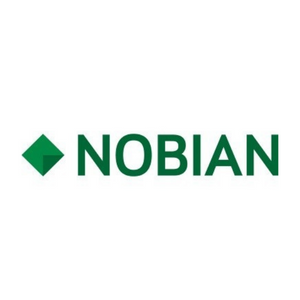
Nobian

Using an innovative decarbonization strategy to benefit their company and country
Nobian is a leading European producer of salt, essential chemicals, and energy solutions for many end industries. The Netherlands-based company’s products play an integral role in accelerating the energy transition. The chemicals they produce are used in solar cells, at-home battery storage systems, sustainable window and door frames, and many other everyday applications. Already a key developer of underground energy storage caverns for natural gas and hydrogen, Nobian aims to become one of the most sustainable chemical companies in Europe. We believe Nobian’s efforts explained below are positioned to support sales and revenue growth in addition to a greener future.
Greening operations
A critical part of their overall decarbonization strategy, Nobian has ambitious climate goals and seeks to reduce direct carbon emissions by 50% by 2030 and 100% by 2040. Additionally, the company aims to reduce their indirect emissions by 50% by 2040, while being fully powered by renewable energy. These goals are tied to a financing that Carlyle worked alongside Nobian to put in place as part of an accredited sustainability-linked bond, which incentivizes accountability toward these goals and positively affects the company’s interest rate where these goals are achieved.
To reach these goals, Nobian has developed a concrete pathway to electrify their production processes including through the use of innovative and proven technologies. In addition, setting a 100% renewable energy use target by 2040 may help Nobian become a carbon neutral company in the same year. Nobian also has plans to reuse 100,000 metric tons of salt by 2025 under its circularity workstream.
The transition to a wind- and solar-based sustainable energy system may make the energy supply and demand balance more volatile, challenging the electricity grid’s stability. By applying Industry 4.01 concepts, Nobian’s electrolysis plants operate with the flexibility to help stabilize the grid. Furthermore, Nobian aims to make 25% of its electricity-based production capacity available for grid stabilization by the end of 2023.
Nobian recognizes the power of collaboration in driving sustainable innovation. Its first “Grow Greener Together” innovation challenge invited 43 startups to pitch product ideas that focused on energy storage flexibility, balancing energy volatility, CO2 free heat and steam, and improved heat integration. These focus areas are key for Nobian as they seek to decarbonize their operations. Out of these, four companies were selected for a two-day workshop to co-develop their innovative solutions with Nobian’s engineers. The start-ups also banked an important customer that ultimately facilitated their scale as climate-oriented solutions providers and received access to Nobian’s global network of experts, bridging the gap between cutting-edge innovation and scaled application.
Developing new commercial opportunities
Beyond driving operational efficiencies, Nobian is unlocking new commercial opportunities at the forefront of the green chemical movement. The company has a goal to have 40% of total sales volumes available with low carbon footprint products by 2025. One such product is chlor-alkali, which is integral to the electrolysis process when hydrogen is manufactured. In anticipation of increasing demand for green hydrogen, Nobian started supplying certified green hydrogen in 2021 as the first certified chlor-alkali plant in Germany under TÜV Süd CMS 70. The company is also piloting the use of blockchain technology to further cement their leadership in traceability and transparency.
In addition to developing their own portfolio of green products, the company seeks to support the creation of new value chains that drive sustainable use and reduce their global carbon footprint. Nobian entered a strategic partnership with Vulcan Energy to produce lithium hydroxide from a carbon neutral geothermal lithium source and is working to reduce the carbon footprint of cement. Nobian is also working towards repurposing their own assets to unlock new business opportunities, including developing specially designed salt caverns to store renewable energy in the form of compressed air energy storage with a partner company. This is intended to aid the energy transition in the Netherlands by providing access to renewable energy despite the absence of wind and sunlight. The pilot phase caverns can supply 150,000 households per annum energy.
Collectively, these can yield tangible results for the company and country. Salt mining is now an activity of “strategic interest” in The Netherlands. Strategic customers have expressed interest in Nobian’s certified low carbon chemicals. For example, Nobian is working with the Dutch government to develop projects to further accelerate their decarbonization roadmap by as much as 10 years. A key part in this will involve the electrification of the energy-intensive salt production process. Delivering on all projects could amount to 1% of the government’s own carbon reduction target for the industrial sector2.
All data has been provided directly by the relevant portfolio company and has not been verified by Carlyle or any third party. References to a particular portfolio company should not be considered a recommendation of any particular security, investment, or portfolio company. The information provided about the portfolio company is intended to be illustrative, and is not intended to be used as an indication of the current or future performance of this or any of Carlyle’s portfolio companies. ESG goals, targets and commitments are not binding on investment decisions and/or Carlyle’s management of investments (unless otherwise specified, where applicable, in fund documentation or regulatory disclosures) and any reference herein to environmental, social or governance considerations is not intended to qualify our duty to maximize risk adjusted returns. There is no guarantee that any ESG target or related projection will be met, that any ESG activities will be implemented to the same degree for other Carlyle investments or that they will create a positive ESG or financial impact. Descriptions of any ESG or impact achievements or improved practices or outcomes are not necessarily intended to indicate that Carlyle has substantially contributed to such achievements, practices, or outcomes. For instance, Carlyle’s ESG efforts may have been one of many factors—including such other factors as engagement by portfolio company management, advisors, and other third parties— contributing to the success described in each of the selected case studies. The information provided in these case studies is for informational purposes only and may not be relied on in any manner as advice or as an offer to sell or a solicitation of an offer to buy interests in any fund or other product sponsored or managed by Carlyle or its affiliates.
1 Source: McKinsey https://www.mckinsey.com/featured-insights/mckinsey-explainers/what-are-industry-4-0-the-fourth-industrial-revolution-and-4ir.
2 Source: Nobian
Low carbon footprint products are defined by Nobian. Goals are subject to change and no assurance can be given that goals will be achieved.